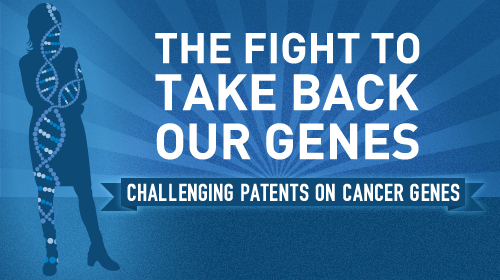Myriad Genetics’ Latest Attempt to Maintain Its Monopoly on Our Genes Rejected


Last June, the U.S. Supreme Court issued a unanimous ruling invalidating patents on human genes. The case was brought by the ACLU, along with the Public Patent Foundation, on behalf of 20medical organizations, geneticists, health advocacy groups, and patients and challenged patents controlled by Myriad Genetics on the BRCA1 and BRCA2 genes. Based on a 30-year-old U.S. Patent & Trademark Office policy, Myriad had obtained its patents on these two genes, which are closely associated with hereditary breast and ovarian cancer risk, and stopped other laboratories in the U.S. from providing genetic testing to patients, even when these labs wanted to offer different, more comprehensive, or less expensive tests.
The Supreme Court concluded that these patents violated long-standing case law prohibiting patents on products and laws of nature. “Myriad did not create or alter any of the genetic information encoded in the BRCA1 and BRCA2 genes. The location and order of the nucleotides existed in nature before Myriad found them. . . genes and the information they encode are not patent eligible simply because they have been isolated from the surrounding genetic material.” Dr. Francis Collins, director of the National Institutes of Health, applauded the ruling, saying it “represents a victory for all those eagerly awaiting more individualized, gene-based approaches to medical care.”
The same day as the decision in Association for Molecular Pathology v. Myriad Genetics was issued, five laboratories announced they would begin offering BRCA testing to patients. In an attempt to hold on to its monopoly, Myriad took legal action against some, but not all, of its new competitors based on patent claims that were not part of the Supreme Court litigation, but should be considered invalid under current precedent. Myriad asked a federal judge in Utah to order one of the laboratories, Ambry Genetics, to stop providing testing of the BRCA genes.
The ACLU filed an amicus brief opposing Myriad’s motion for a preliminary injunction, joined by the Association for Molecular Pathology, AARP, Breast Cancer Action, and the Public Patent Foundation. We argued that Myriad seeks exclusive rights to laws of nature and that a continued monopoly on genetic information undermines the public interest because it limits patients’ options and stands in the way of new developments in medicine and genetics.
Yesterday, a federal district court judge in Utah rejected Myriad’s motion. Judge Shelby found that Myriad had failed to establish that it was likely to win its lawsuit against Ambry, because there are substantial questions about whether Myriad’s patent claims improperly monopolize products of nature, laws of nature, and abstract ideas.
While Myriad’s lawsuits can proceed—for now—patients continue to have the right to choose other BRCA genetic testing providers. They can obtain a second opinion before making life-changing medical decisions. And they can decide which laboratory will have their data. This is especially crucial because Myriad has used its patents over the genes to create the largest database in the world about BRCA genetic mutations and their medical significance and refuses to share that information with the scientific community. The decision reaffirms that one company should not be able to exclusively control our genetic information.
Learn more about gene patenting and your civil liberty rights: Sign up for breaking news alerts, follow us on Twitter, and like us on Facebook.


